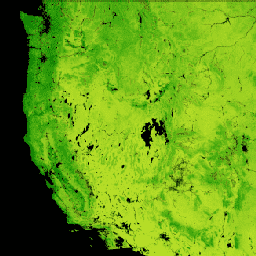Page Summary
-
The Landsat Net Primary Production (NPP) CONUS dataset provides estimates of the amount of carbon captured by plants in an ecosystem for the conterminous United States.
-
The dataset spans from 1986 to 2020 and is updated annually.
-
NPP is calculated using the MOD17 algorithm with data from Landsat Surface Reflectance, gridMET, and the National Land Cover Database.
-
The dataset includes bands for annual net primary production (
annualNPP) and the percentage of gap-filled Landsat composites (QC) at a 30-meter pixel size. -
This dataset is in the public domain and free of known copyright restrictions, with a suggested citation provided.

- Dataset Availability
- 1986-01-01T00:00:00Z–2020-01-01T00:00:00Z
- Dataset Provider
- University of Montana Numerical Terradynamic Simulation Group (NTSG)
- Cadence
- 1 Year
- Tags
Description
The Landsat Net Primary Production (NPP) CONUS dataset estimates NPP using Landsat Surface Reflectance for CONUS. NPP is the amount of carbon captured by plants in an ecosystem, after accounting for losses due to respiration. NPP is calculated using the MOD17 algorithm (see MOD17 User Guide) with Landsat Surface Reflectance, gridMET, and the National Land Cover Database.
Bands
Pixel Size
30 meters
Bands
| Name | Units | Min | Max | Scale | Pixel Size | Description |
|---|---|---|---|---|---|---|
annualNPP |
kg*C/m^2 | 0 | 65535 | 0.0001 | meters | Annual net primary production |
QC |
% | 0 | 255 | meters | Percentage of gap-filled Landsat 16-day composites. Gaps are caused by missing data, high cloud contamination, and/or erroneous pixels. A value of 255 indicates incomplete data due to failure of the gap-filling method. |
Terms of Use
Terms of Use
This work is in the public domain and is free of known copyright restrictions. Users should properly cite the source used in the creation of any reports and publications resulting from the use of this dataset and note the date when the data was acquired.
Citations
Robinson, N.P., B.W. Allred, W.K. Smith, M.O. Jones, A. Moreno, T.A. Erickson, D.E. Naugle, and S.W. Running. 2018. Terrestrial primary production for the conterminous United States derived from Landsat 30 m and MODIS 250 m. Remote Sensing in Ecology and Conservation. doi:10.1002/rse2.74
Explore with Earth Engine
Code Editor (JavaScript)
var dataset = ee.ImageCollection('UMT/NTSG/v2/LANDSAT/NPP') .filter(ee.Filter.date('2016-01-01', '2016-12-31')); var npp = dataset.select('annualNPP'); var nppVis = { min: 0.0, max: 20000.0, palette: ['bbe029', '0a9501', '074b03'], }; Map.setCenter(-98.26, 39.32, 5); Map.addLayer(npp, nppVis, 'NPP');